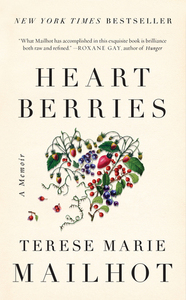Take a photo of a barcode or cover
challenging
dark
emotional
hopeful
reflective
sad
tense
fast-paced
Moderate: Child abuse, Domestic abuse, Emotional abuse, Mental illness, Physical abuse, Alcohol
Heart Berries is a fascinating and profound lyrical exploration of mental illness, abuse, neglect and love viewed through two divergent cultural contexts. I would have liked a little more story to the story, but at the same time that’s not what Mailhot is doing—rather, she gives the reader a fragmented view of her world, a kaleidoscope through which to view her experience and your perceptions of what love and ambition are.
challenging
dark
reflective
dark
emotional
reflective
fast-paced
It took me a bit to settle in--I didn't know it would basically be poetry. But boy, once it got going...
Mailhot arrives as a stunning, haunted voice in non-fiction. Her essays lay out her life through her sons, her lovers, her mental illness, and her culture. She is one of the few writers able to effectively step back from herself and see herself as we might - flawed, broken, whole. Her memoir bleeds on every page and screams its way down inside you. As always, you can find mini, individual reviews below.
Indian Condition (first) - 3/5
Really poetic and lovey but a bit too detached for my taste
Heart Berries - 4/5
This was beautiful. It gave voice to some of my hidden fears.
Indian Sick -5/5
Let’s get something clear: I will never not like a well written letter to an ex. That’s my MO.
In a Pecan Field - 4/5
I see a lot of myself in her.
Your Black Eye and My Birth - 5/5
She is able to do the hardest thing in a memoir: step back from herself.
I Know I’ll Go - 4/5
A really honest look at her dad.
Little Mountain Woman - 5/5
My favorite so far.
The Leaving Deficit - 3/5
This was a bit too disjointed for me.
Thunder Being Honey Bear - 4/5
An honest piece on trauma
Indian Condition (second) - 5/5
Really beautiful. I feel like this should have been the last piece.
Better Parts - 3/5
This as the last piece really emphasizes the role her mother played in her life. I don’t feel it was as strong as some her others, however.
Indian Condition (first) - 3/5
Really poetic and lovey but a bit too detached for my taste
Heart Berries - 4/5
This was beautiful. It gave voice to some of my hidden fears.
Indian Sick -5/5
Let’s get something clear: I will never not like a well written letter to an ex. That’s my MO.
In a Pecan Field - 4/5
I see a lot of myself in her.
Your Black Eye and My Birth - 5/5
She is able to do the hardest thing in a memoir: step back from herself.
I Know I’ll Go - 4/5
A really honest look at her dad.
Little Mountain Woman - 5/5
My favorite so far.
The Leaving Deficit - 3/5
This was a bit too disjointed for me.
Thunder Being Honey Bear - 4/5
An honest piece on trauma
Indian Condition (second) - 5/5
Really beautiful. I feel like this should have been the last piece.
Better Parts - 3/5
This as the last piece really emphasizes the role her mother played in her life. I don’t feel it was as strong as some her others, however.
I found this memoir affecting, though it doesn't linger in my consciousness. It was difficult to create that film in my mind that happens when reading more textured, sensory books, largely because the narrative is constructed as a meditative letter, or direct address, to a particular person, Casey, the author's on-and-off again partner. Without setting (I can't see the landscape, or interiors), or deeper portraiture (I never come to know Casey), or scenes (there are a few), the words, however lovely, don't penetrate. In other words, I enjoyed being immersed in this book while reading it, but when I put it down, I felt no lasting resonance. The use of the direct address to Casey positions the reader outside of the story, as a voyeur, not part of the conversation (which can at times feel like an f.u. to the reader). I can't see why the narrative is constructed in this way; I don't think speaking to Casey directly added anything to the story, and for me anyway, it detracted from its narrative power. Still, it's worth reading, even if it doesn't live up to the blurb-hype ("brilliance both raw and refined" and "an epic take--an Iliad for the indigenous" and "an astounding memoir in essays" (it is not a memoir in essays really, but a memoir in epistolary form, slipping on occasion into scene and straight narrative, but mostly a long letter to Casey, and at the end, to her mother).
4.5 stars. I can't stop thinking about this book. it was an alarmingly quick read but I think that's mainly because the author is so spare with her words. the structure of her writing is reflected by the chaos and pain of her life. I'm really not doing it justice!
I think that if i read this and not listened to it via audiobook i would have enjoyed it more. I think this book spoke on so many things and I give credit to it for that. One thing I didn't like was how it often referred to the reader as "I came to YOU. I thought of YOU. And YOU..." and while i understand why it was used, I personally kept getting taken out of the story for it. Like what do you mean EYE did that, i didn't ;-;







